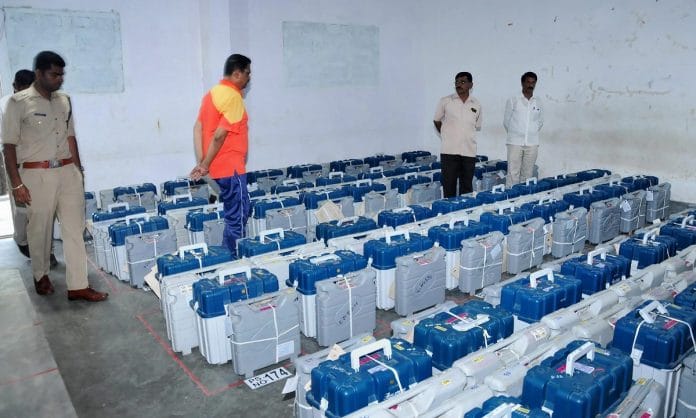Thank you dear subscribers, we are overwhelmed with your response.
Your Turn is a unique section from ThePrint featuring points of view from its subscribers. If you are a subscriber, have a point of view, please send it to us. If not, do subscribe here: https://theprint.in/subscribe/
In a democracy, the fundamental rule is that one side wins and the other loses. This principle played out recently in Haryana and Maharashtra, where the ruling BJP retained power. However, what should have been a routine democratic process has once again turned into a controversy, with opposition parties, led by the Indian National Congress (INC), raising baseless allegations about the integrity of Electronic Voting Machines (EVMs).
In a shocking display of political rhetoric, the INC National President recently announced plans to agitate for a return to paper ballots, accusing the BJP of manipulating EVMs. According to this narrative, the BJP allegedly orchestrates victories in larger states while deliberately losing smaller ones to maintain a façade of fairness. Such claims are not only unfounded but also dangerous, as they undermine public trust in India’s democratic institutions.
Judiciary’s Stand on EVMs
The Supreme Court of India, the guardian of our Constitution, has repeatedly upheld the reliability of EVMs. Despite numerous petitions and allegations, the Court has consistently found no merit in claims that EVMs are susceptible to tampering. The Election Commission of India (ECI) has also maintained that EVMs are secure and transparent, having introduced the Voter Verifiable Paper Audit Trail (VVPAT) to further enhance confidence in the electoral process.
Who are these politicians to challenge the judiciary’s authority and credibility? Their remarks are not only an affront to the judiciary but also to the millions of election officials and citizens who ensure the sanctity of our elections.
Misleading Comparisons with Other Democracies
The opposition often cites examples from countries like the United States and Germany to justify their stance. However, these comparisons are misleading and fail to consider India’s unique demographic and logistical challenges. The U.S., with a population of around 33 crore, faced significant turmoil during the 2020 presidential elections when Donald Trump refused to accept the results. Germany, with a population of approximately 8 crore, employs a paper ballot system, but its scale is minuscule compared to India.
Consider this: Maharashtra alone has 9.7 crore registered voters, surpassing the entire population of Germany. India’s electoral machinery manages over 91 crore voters across diverse geographies, languages, and socio-economic conditions. Comparing our electoral processes to those of smaller, more homogenous countries is both unfair and illogical.
The Opposition’s Double Standards
The opposition’s hypocrisy becomes evident when examining their reactions to election outcomes. When the INC won the Karnataka assembly elections earlier this year—an economically significant and politically crucial state—there were no complaints about EVMs. Similarly, during the 2019 Lok Sabha elections, when the INC secured 99 seats, EVMs were not questioned. However, when they lose, the same machines suddenly become unreliable.
This selective outrage reveals a troubling trend: the opposition is more interested in finding scapegoats than introspecting on their electoral strategies. Instead of focusing on organizational weaknesses or presenting a compelling vision to voters, they resort to undermining the very institutions that uphold our democracy.
The Danger of Undermining Institutions
The relentless attack on EVMs is part of a broader pattern of delegitimizing institutions like the Election Commission and the judiciary. Such rhetoric has far-reaching consequences. By questioning the credibility of these institutions, the opposition sows seeds of doubt and fear among the public. This strategy is not only irresponsible but also dangerous, as it risks inciting unrest and eroding faith in democratic processes.
History offers cautionary tales of the perils of such tactics. In Bangladesh, political machinations led to the toppling of governments, persecution of minorities, and widespread chaos. The opposition’s current approach, driven by desperation and vested interests, threatens to push India down a similar path.
Time to Call the Bluff
The irony of the situation is glaring. It was the INC that introduced EVMs in India, and they have reaped the benefits of this system in numerous elections. The party’s victories in constituencies like Wayanad, where Rahul Gandhi himself won, were achieved through the very EVMs they now deride. This selective memory and opportunistic stance highlight the opposition’s lack of a coherent narrative.
The INC’s obsession with defending a particular family has clouded its judgment. In their bid to safeguard dynastic interests, they forget that India is much larger and more resilient than their political ambitions. The INC and other opposition parties must realize that democracy thrives on constructive criticism and credible alternatives, not on baseless allegations and fear-mongering.
Conclusion
The opposition’s constant EVM bashing is an affront to the democratic spirit of India. Instead of engaging in self-reflection and working harder to connect with the electorate, they choose the path of slander and misinformation. Such tactics may yield short-term political gains but at a great cost to the nation’s democratic fabric.
India, with its vast and diverse electorate, deserves better from its political leaders. It is time for the opposition to rise above petty politics and contribute meaningfully to the democratic process. As citizens, we must remain vigilant and reject attempts to undermine the institutions that form the bedrock of our democracy.
These pieces are being published as they have been received – they have not been edited/fact-checked by ThePrint


